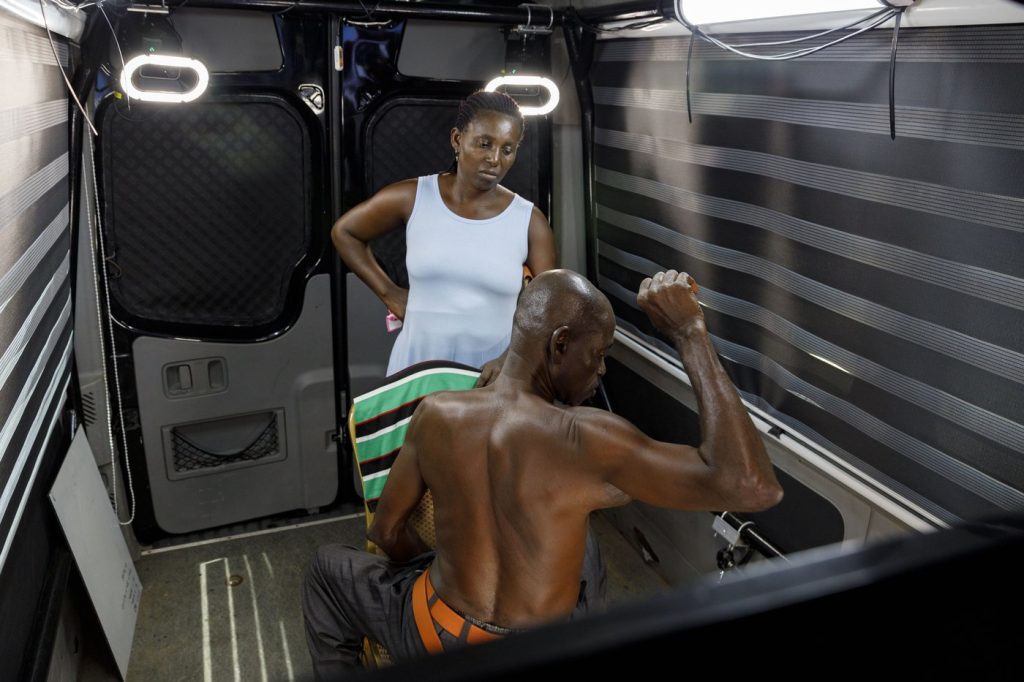KOFORIDUA, Ghana (AP) — Charles Owusu Aseku, a 46-year-old man, has been on a quest for medical treatment for a large keloid growth on his neck since 2002. His journey has taken him across Ghana and even to South Africa, but despite two unsuccessful surgeries and a mere consultation in South Africa, he remained undeterred. His frustration was palpable as he was readying himself for yet another medical trip when he learned about a groundbreaking initiative in February 2025—the first live trial of 3D telemedicine technology in Ghana, facilitated through computer screens inside a van.
The innovative project, spearheaded by Microsoft's research team in collaboration with local doctors and researchers, aims to address the lack of specialized medical care in Ghana, which struggles with one of the lowest doctor-to-patient ratios globally. By utilizing 3D telemedicine technology, the initiative aspires to provide remote medical consultations to patients either awaiting surgeries or in need of post-operative care.
This portable system, which builds on trials previously conducted in Scotland, includes enhancements such as better lighting and upgraded cameras. Inside the mobile van, a 3D model of each patient is captured and displayed on a large screen. This allows multiple doctors from various locations to join the consultation simultaneously and manipulate the 3D image to better assess the patient's condition.
Spencer Fowers, the principal software developer and project lead at Microsoft Research, emphasized that the purpose of the mobile van is to reach remote villages lacking specialized medical services. This technology aims to facilitate pre or post-surgical consultations. For patients like Aseku, the ability to connect with doctors from countries such as Rwanda, Scotland, and Brazil during his session was a source of hope. He expressed optimism that the diverse expertise might finally lead to a solution for his persistent medical issue.
The trial was launched at the Koforidua Regional Hospital, located in Ghana's Eastern Region. Researchers involved in the project are eager for this trial to pave the way for larger-scale operations that could further explore the utility of the technology. The growing adoption of telemedicine, especially catalyzed by the COVID-19 pandemic, highlights its potential to serve patients in Africa, where specialist doctors are scarce in a continent with 1.4 billion inhabitants.
Another participant, George Opoku, 68, was affected by the logistical challenges of healthcare access. He had previously sought treatment for sarcoma—a rare cancer—at the Korle-Bu Teaching Hospital in Accra, nearly 100 kilometers away from Koforidua. Upon hearing of the 3D telemedicine trial, his doctor registered him for the program, saving the considerable expenses and stress associated with long-distance travel. Opoku's experience in the van, where he could introduce himself and discuss his condition with multiple doctors, left him feeling optimistic about his care.
A significant hurdle for the initiative remains the inconsistent internet access in many remote regions of Africa. Nevertheless, the pilot program at Korle-Bu Teaching Hospital is already demonstrating utility for patients needing plastic surgery, reflecting the scarcity of specialized surgeons in the area. Dr. Kwame Darko, a consultant plastic surgeon involved in the study, highlighted that 3D telemedicine could allow patients to consult several doctors during a single session, streamlining the process of seeking medical advice.
Dr. Ahensan Dasebre, chief resident doctor at the National Reconstructive Plastic Surgery and Burns Centre at Korle-Bu, is hopeful about the impact of such technologies. He pointed out that the existing shortfall in healthcare professionals means that patients in remote areas, who require specialized care, could significantly benefit from this innovative telemedicine solution. This approach could provide crucial access to high-quality healthcare that many currently lack.










